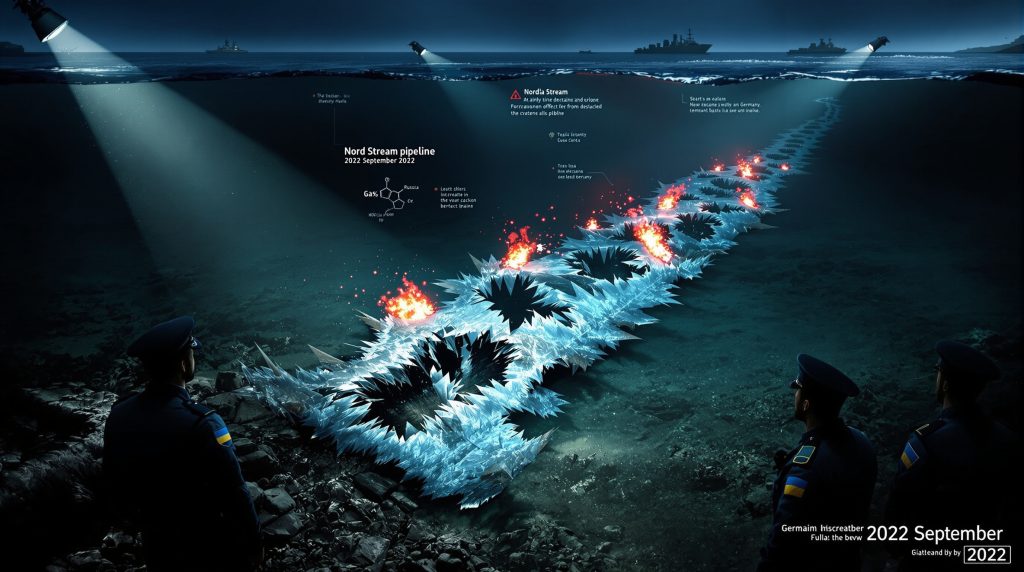Ukrainian Arrested in Italy for Nord Stream Pipeline Explosions: What We Know
Italian authorities have arrested a Ukrainian national in connection with the 2022 Nord Stream pipeline explosions, marking a significant development in the investigation into one of Europe's most serious infrastructure attacks in recent history. This arrest represents the first publicly confirmed detention directly linked to the sabotage that damaged the undersea natural gas pipelines connecting Russia to Germany.
Who Was Arrested in Connection with the Nord Stream Pipeline Sabotage?
The Ukrainian citizen, whose identity has not been fully disclosed in initial reports, was taken into custody by Italian law enforcement following an international investigation involving multiple European security agencies. The arrest occurred as part of a coordinated effort to identify those responsible for the September 2022 explosions that severely damaged the Nord Stream 1 and Nord Stream 2 pipelines in the Baltic Sea.
The suspect reportedly faces serious charges related to infrastructure sabotage, potentially including participation in an act of international terrorism, deliberate damage to critical energy infrastructure, conspiracy to commit sabotage with international implications, and environmental crimes related to the methane release.
What Happened to the Nord Stream Pipelines?
The Nord Stream pipeline system suffered catastrophic damage on September 26, 2022, when four separate explosions occurred in Danish and Swedish waters in the Baltic Sea. These powerful blasts created major ruptures in three of the four pipelines comprising the Nord Stream 1 and Nord Stream 2 systems, causing significant natural gas leaks that were visible from satellite imagery.
The explosions resulted in the release of an estimated 500,000 tons of methane into the atmosphere, completely disrupting gas flow through Nord Stream 1 and preventing Nord Stream 2 from ever becoming operational. Environmental experts classified this as one of the largest single methane releases in history, causing significant damage to marine ecosystems in the affected areas.
Strategic Significance of the Pipelines
The Nord Stream pipeline system represented a major energy supply route from Russia to Germany and Western Europe, capable of transporting up to 110 billion cubic meters of natural gas annually. The project had been controversial from its inception, with critics arguing it increased European dependence on Russian gas supplies.
For Russia, the pipelines served as a key component of its energy transition & security strategy, allowing direct supply while bypassing traditional transit countries like Ukraine and Poland. With an estimated combined construction cost exceeding €20 billion, the Nord Stream system was one of the most significant energy infrastructure investments in Europe.
How Has the Investigation Progressed?
The investigation into the Nord Stream explosions has involved multiple countries and agencies working in coordination. Swedish, Danish, and German authorities conducted initial investigations, with underwater surveys documenting the extent of the pipeline damage. Forensic teams collected evidence from the seabed near the explosion sites, while intelligence agencies from several NATO countries contributed to the broader investigation.
Prior to this arrest, various theories about responsibility had circulated widely. Some Western officials initially suspected Russian submarines or special forces, while others pointed to Ukrainian non-state actors. Russian allegations implicated certain Western intelligence agencies, and several media investigations suggested private pro-Ukrainian groups might have been involved.
Breakthrough Leading to the Arrest
While specific details remain classified, the arrest in Italy appears to have resulted from a combination of technical evidence gathered from the explosion sites, intelligence sharing between European security services, tracking of suspect movements across European borders, and digital forensics connecting the suspect to planning activities.
The timing of the arrest comes amid renewed tensions between Ukraine and Russia, with recent escalations in military activities. According to reports from Reuters, "Russia launched a major air assault near the EU border, and Ukraine responded with a strike on a Russian refinery," highlighting the ongoing volatility in the region.
What Are the Geopolitical Implications?
This development could have significant implications for the ongoing conflict between Ukraine and Russia. Russia may use the arrest to support its narrative about Ukrainian responsibility for the sabotage, potentially complicating Ukraine's international support if official involvement is proven. Questions remain about whether the suspect acted alone or as part of a larger operation authorized by state actors.
The arrest occurs against a backdrop of complex diplomatic maneuvering, with ongoing discussions "involving former U.S. President Donald Trump, Ukrainian President Volodymyr Zelenskiy, and the prospect of including Russia in a trilateral summit." These diplomatic initiatives could be affected by new revelations about the pipeline sabotage.
European Energy Security Considerations
Since the 2022 explosions, Europe has significantly reduced its dependence on Russian gas, rapidly expanding LNG import capacity and developing alternative pipeline routes. The incident highlighted vulnerabilities in undersea critical infrastructure, prompting increased security measures across Europe's energy network.
The pipeline sabotage accelerated Europe's energy transition away from Russian supplies, with countries like Germany building new LNG terminals in record time to diversify their energy sources. This shift has permanently altered European energy security calculations and infrastructure planning, creating new energy export challenges for traditional suppliers.
International Sanctions and Energy Markets
The arrest comes amid continuing tensions over Russian energy exports and international sanctions. India currently sources "roughly 35% of its total oil imports from Russia," prompting the U.S. to impose "25% tariffs on Indian goods, effective August 27" related to these Russian crude imports.
Market analysts noted that "some geopolitical risk premium is slowly being pumped back into the market" as these tensions continue to affect global energy prices and trading patterns. The ongoing US‑China trade war impact further complicates the global energy landscape, creating additional market uncertainties.
What Legal Processes Will Follow?
The case presents complex legal challenges, beginning with determining which country has primary jurisdiction over the pipeline sabotage. The explosions occurred in international waters but within the exclusive economic zones of Denmark and Sweden. Both countries, along with Germany as the pipeline destination, could make legitimate claims for jurisdiction.
Potential extradition requests from Germany, Denmark, or Sweden may follow, raising questions about where the suspect would ultimately face trial. The legal process will need to navigate international maritime law considerations for crimes committed in international waters.
Evidence Requirements for Prosecution
For a successful prosecution, authorities will need to establish the suspect's direct involvement in the physical act of sabotage, any connections to broader networks or state actors, the chain of command if others were involved, and the motivations and planning timeline for the attack.
Prosecutors face the challenge of gathering evidence from an underwater crime scene spanning multiple jurisdictions, while also addressing the highly sensitive political implications of the case.
How Might This Affect Future Infrastructure Security?
The Nord Stream incident and subsequent investigation highlight several critical vulnerabilities in undersea energy infrastructure. The attacks demonstrated how relatively unprotected these vital systems are despite their strategic importance, prompting a comprehensive reassessment of critical infrastructure protection protocols across Europe.
In response to the Nord Stream attacks, several security enhancements have been implemented, including increased naval patrols near critical undersea infrastructure, enhanced monitoring systems for pipeline integrity, improved coordination between NATO and EU on maritime security, and greater investment in surveillance technologies for seabed activities.
Industry Response
The energy sector has responded with a comprehensive reassessment of risk models for transnational pipeline projects. Insurance costs for undersea infrastructure have increased substantially, reflecting the newly recognized threats. Companies are investing in more resilient pipeline technologies with enhanced monitoring capabilities and developing diversification strategies to reduce vulnerability to single-point failures.
Future pipeline projects will likely incorporate more robust physical protection measures, redundant systems, and enhanced monitoring capabilities, significantly increasing development costs but providing greater security assurances. These measures are particularly important as countries implement new critical minerals order policies to secure supply chains.
What Questions Remain Unanswered?
Despite the arrest, numerous questions remain about the Nord Stream sabotage. Investigators continue to pursue whether the suspect acted alone or as part of a larger group, if state actors provided support, direction, or resources, and what the ultimate strategic objective behind the sabotage was.
Technical questions persist about how the explosives were placed at significant depths, what specialized equipment and expertise were required, how the operation evaded detection during planning and execution, and whether insider knowledge of the pipeline systems was utilized.
Broader Conspiracy Questions
The investigation will likely continue to explore whether other suspects remain at large, if similar operations were planned against other infrastructure, what intelligence gaps allowed the operation to succeed, and how future attacks might be prevented through early detection.
Security analysts are examining whether the Nord Stream attack represents a new form of hybrid warfare targeting critical infrastructure, potentially setting a dangerous precedent for future conflicts. Furthermore, the incident has raised concerns about how global market tariffs and trade restrictions might affect critical infrastructure security in other regions.
FAQ: Nord Stream Pipeline Explosions
What were the Nord Stream pipelines?
The Nord Stream pipeline system consisted of two parallel pipeline systems (Nord Stream 1 and 2) running under the Baltic Sea from Russia to Germany, designed to transport natural gas directly to Western Europe while bypassing transit countries.
When did the explosions occur?
The explosions took place on September 26, 2022, causing multiple leaks in the pipeline system.
How were the explosions carried out?
Investigators believe the explosions were caused by deliberately placed explosive devices, likely requiring specialized diving or underwater vehicle capabilities.
What was the environmental impact?
The explosions released hundreds of thousands of tons of methane—a potent greenhouse gas—into the atmosphere, creating one of the largest single methane release events recorded.
Has anyone claimed responsibility for the attack?
No credible claims of responsibility were made prior to this arrest, though numerous theories have circulated about potential perpetrators.
What has been Russia's response to the explosions?
Russia has consistently denied involvement and has instead suggested Western powers or Ukraine were responsible for the sabotage.
How has the attack affected European energy supplies?
While the attack occurred during an already-developing energy crisis, Europe had already begun reducing Russian gas imports and was able to secure alternative supplies, primarily through increased LNG imports.
A Complex Case with Far-Reaching Implications
The arrest of a Ukrainian national in Italy marks a significant development in the Nord Stream pipeline sabotage investigation, but it likely represents just one piece of a complex geopolitical puzzle. As the legal process unfolds, more details may emerge about one of the most serious attacks on European energy infrastructure in recent history.
The case highlights the vulnerability of critical infrastructure in an era of hybrid warfare and raises important questions about security, attribution, and deterrence in international conflicts. It also underscores the strategic importance of energy infrastructure and the lengths to which actors might go to disrupt it during times of geopolitical tension.
As European authorities proceed with their case against the suspect, the international community will be watching closely for evidence that might clarify the full scope of the operation, including whether it was the work of a lone actor or part of a larger coordinated effort with state backing.
The outcome of this case could have lasting implications for European energy export challenges, NATO-Russia relations, and the ongoing conflict in Ukraine. It serves as a stark reminder of how energy infrastructure has become a primary battleground in modern geopolitical conflicts.
Disclaimer: This article presents information based on current reports about an ongoing investigation. Details may change as new information becomes available, and all suspects are presumed innocent until proven guilty in a court of law.
Ready to Stay Ahead of Major Mineral Discoveries?
Unlock instant notifications on significant ASX mineral discoveries with Discovery Alert's proprietary Discovery IQ model, turning complex mineral data into actionable investment insights. Explore how major mineral discoveries can lead to significant market returns by visiting Discovery Alert's dedicated discoveries page, showcasing historic examples of exceptional outcomes.




